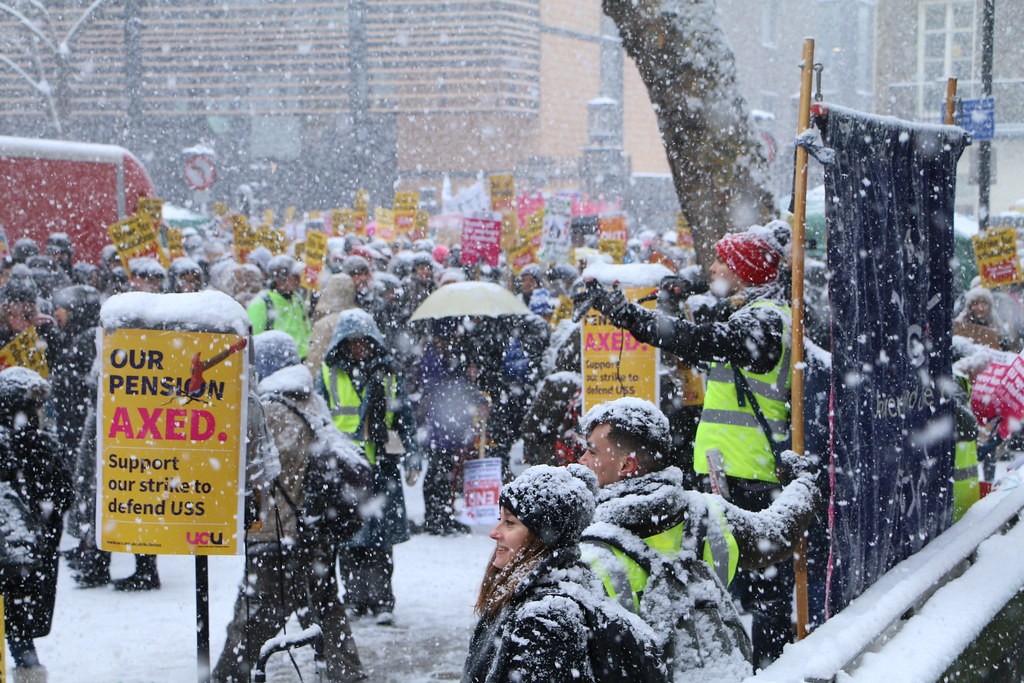A brief perusal of the University and Colleges Union’s (UCU) social media output would give the impression that this is a unified union with a clear idea of how it plans to conduct both of its main disputes in higher education. Blocking out the noise and performative leftness of the social media team, it is apparent that this is a union beset by division, as is evident by the various blog posts from different factions within the UCU.
The main ongoing ones are the pension dispute with Universities UK (UUK), an advocacy group consisting of 140 higher education institutions, over the Universities Superannuation Scheme pension (USS) and the ‘Four Fights’ dispute with the Universities and Colleges Employers Association).
The pension dispute has been taking place since 2018 when, in an effort to confront the pension fund’s deficit, UUK announced that it would look to change the scheme from defined benefits to defined contributions. As well as this, the scale of employee contributions has also been increased, which recently led to industrial action.
The December 2021 strike over pensions was indicative of the internal divisions that undermine the UCU’s negotiating strategy. This strike was a response to the Joint Negotiating Committee of USS voting through proposals from UUK in the absence of any formal proposals from the UCU; the failure of the UCU bring forth its own proposals made it easier for UUK’s to be accepted and has significantly shaped the latest iteration of this dispute.
The UCU farcically published its own proposals in a press release on the 31st of August. It appears that the its paralysis was due to internal disagreements about what precisely these proposals should be. These internal divides were also evident when UCU started to plan its industrial action.
Initially Joe Grady, the UCU’s general secretary, had proposed two separate one day strikes for both UCU disputes (the dispute with UUK over the USS and the ‘Four Fights’ dispute with UCEA) and no commitment to escalating strike action. Grady wanted to call an aggregated ballot; when the UCU attempted to do this in January 2019 it had a turn-out of only 41% and, consequently, failed to clear the 50% threshold mandated by the 2016 Trade Union Act. It appears that the objective this time was to call an aggregate ballot as a test-run for future action and as a warning to higher education employers. The UCU leadership must always be seen to make a stand.
Grady’s plan was never put into action. After pressure from branch delegates at the Branch Delegate Meeting (where UCU Left delegates pushed for five days of action in December) on the 12th of November, the UCU ended up announcing that it would now run a disaggregated ballot for three days of strike action with both disputes running simultaneously. Moreover, the UCU publicly committed itself to a course of escalating action if these strikes proved to be unsuccessful, which they predictably did, and agreed to a balloting of the branches that secured at least a 40% turnout but did not pass the 50% threshold. This is a halfway house that pleases no-one; perhaps true compromise is when everyone gets to be equally miserable.
Thus, the UCU ended up with three days of strike action that had only tepid support from the leadership. The UCU striking in December is like miners striking in May; it ignores higher education’s seasonal pattern of production/consumption. Universities make money during strikes (as they do not have to pay staff and students pay upfront) and are more in the business of qualifying than educating; therefore, the time to strike is as close to exam boards as possible. This approach proved particularly effective for the UCU in 2018 when over 700 examiners threatened to strike. One suspects that the UCU leadership are aware of this and, in the absence of being able to strike near exams, decided the most worrying prospect for UUK would be an aggregated ballot resulting in an almost blanket suspension of education across the entire sector, and not piecemeal strikes.
Unfortunately for the UCU, February 28th is the deadline for the Pension Regulator and USS timescales. If there is not a settlement by then, USS can impose significant increases on scheme contributions for both members and employers. These would be 18.8% for members (from 9.8%) and 38.2% for employers (from 21.4%). This deadline makes the internal arguments in the UCU particularly fraught and means that a lot of the internal pressure is not coming exclusively from one faction per se (USS recently blamed the UCU Left) but is a genuine reflection of the anxiety of many of its members.
It is evident that the UCU’s leadership was, quite rightly, never convinced by the merits of sustained action in December 2021; however, it still had to compromise internally. If the UCU cannot fully commit to one approach it will have a limited chance of success. When a strike does not realistically have a chance of budging the employer it becomes nothing more than a protest. This neither reflects well on the UCU’s past achievements during the dispute, nor bodes well for its future success.
The UCU is divided; beyond internal personal disputes, the real driver of these divisions is the reality of work for many of its members. This contributes to a vicious cycle leading to further failure; rinse and repeat. Thus, national campaigns will continue to lack the discipline and unity that are required to win, and members will continue to see their employment conditions eroded.


